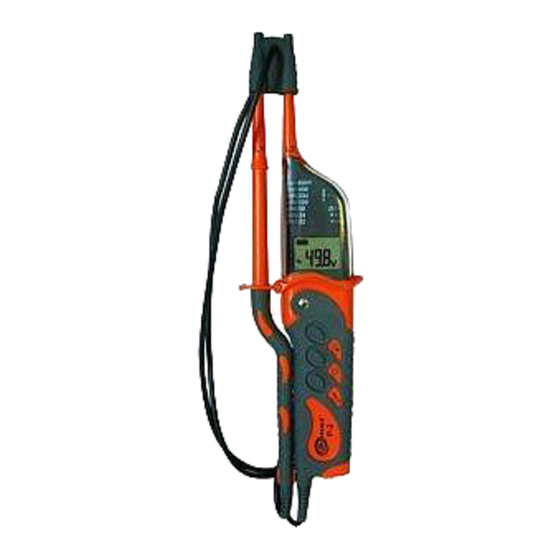
Table of Contents
Advertisement
Quick Links
Advertisement
Table of Contents

Subscribe to Our Youtube Channel
Summary of Contents for Sonel P-2
- Page 3 OPERATION MANUAL VOLTAGE TESTER SONEL S. A. ul. Wokulskiego 11 58-100 Świdnica Version 1.8 May 15, 2012...
- Page 4 Principal characteristics of the device: • Measurement of direct and alternative voltage presented on a display within the range be- tween 1.5 and 750V with the maximum exacti- tude of 0.1V, • Indication of direct and alternative voltage on the diode indicator: 12, 24, 50, 120, 230, 400, 690V, •...
-
Page 5: Table Of Contents
TECHNICAL DATA......10 MANUFACTURER......12 Thank you for having purchased our voltage tester. The P-2 tester is a modern, high-quality measure- ment instrument, which is easy and safe to use. However, reading the present manual will permit you to avoid measurement errors and prevent possible problems regarding operation of the de- vice. -
Page 6: Safety
Safety The purpose of the P-2 device is to test volt- age and the continuity of connections as well as measurements of resistance. In order to guarantee the correct operation of the device and correctness of the obtained results observe the following rec- ommendations: •... -
Page 7: Measurements
Note: The device may also be used during rain, however at user’s own responsibility. It is recommended to use gauntlets. Measurements Control of operation of the tester Before each use of the tester, it is necessary to control its operation: •... -
Page 8: Rcd Operation Test
Note: In the networks protected with an RCD switch whose nominal current is 10mA or 30mA, it is pos- sible that the switch is activated during a meas- urement of voltage between L and PE. In order to avoid that connect the tester between L and N and after approximately five seconds switch the probe from N to PE. -
Page 9: Circuit Continuity Test
(e.g. using insulated personal protection means or in the case of an insulated work station). One-pole phase testing may not be a sufficient means to determine whether the circuit in question is live. Do apply the two-pole voltage test. Circuit continuity test Note! The measured object may be live. -
Page 10: Phase Order Test
Illumination of the measured point The P-2 tester offers the possibility of illumina- tion of the measured area under difficult light con- ditions (e.g. in switchgears). In order to illuminate the measured point press the button marked with the symbol . -
Page 11: Replacement Of The Batteries
Replacement of the batter- The tester is powered by means of two 1.5V AAA batteries. A lack of acoustic signal once both the probes have been closed, too weak illumina- tion after the button has been pressed or the symbol appearing on the display indicate the necessity to replace the batteries. -
Page 12: Dismantling And Utilization
Dismantling and utilization Worn electric and electronic equipment must be disposed of selectively, i.e. it must not be dis- posed of along with waste of other kinds. Send worn electronic equipment to a collection point in accordance with the act on worn electric and electronic equipment. - Page 13 The diode indicator functions also without batter- ies. The frequency of the measurement voltage for the diode indicator: 15…400Hz. Measurement of resistance: Fundamental Range Exactitude uncertainty ±(3% d.v. + 0...1999Ω 1Ω 8 digits) Other data: a) Kind of insulation: double, in accordance with EN 61010-1 b) Measurement category: III 1000V (IV 600V) in accordance with EN 61010-1...
-
Page 14: Manufacturer
EN 61326-1:2006 and EN 61326-2-2:2006 8 Manufacturer The manufacturer of the instrument who pro- vides guarantee and post-guarantee service is: SONEL S.A. ul. Wokulskiego 11 58-100 Świdnica Poland tel. +48 74 858 38 60 fax +48 74 858 38 09 E-mail: export@sonel.pl...















Need help?
Do you have a question about the P-2 and is the answer not in the manual?
Questions and answers